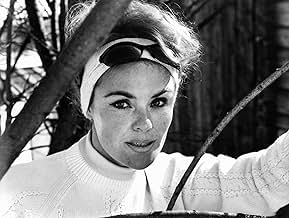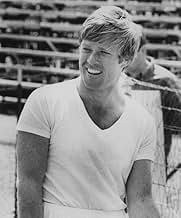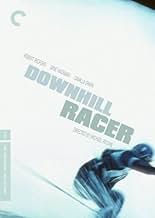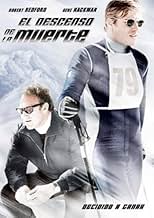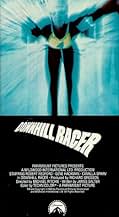IMDb RATING
6.3/10
5.7K
YOUR RATING
Quietly cocky David Chappellet joins the U.S. ski team as downhill racer and clashes with the team's coach, Eugene Claire.Quietly cocky David Chappellet joins the U.S. ski team as downhill racer and clashes with the team's coach, Eugene Claire.Quietly cocky David Chappellet joins the U.S. ski team as downhill racer and clashes with the team's coach, Eugene Claire.
- Won 1 BAFTA Award
- 1 win & 5 nominations total
- Director
- Writers
- All cast & crew
- Production, box office & more at IMDbPro
Featured reviews
After many years of catching brief scenes of this now semi-cult film, I finally watched it in its entirety. It is not a great film, but for film students, and fans of both Gene Hackman and Robert Redford, it's a must. The opening credits are delivered over scenes of a Super G skier flying down the mountain and feature a combination of stop action and over-cranked footage. The film quality is beautiful, and although the techniques now seem dated, they stand for what was cutting-edge editing at the time. Watching the opening, you feel like you're in for a great ride but are sadly let down by a staid script. Having said that, the film can sort of get a way with this (at least to a certain extent) because you've got such great actors playing the main roles of skier (Redford) and coach (Hackman). Both know how to exploit the economy of language and show a lot simply with body language and expression. (They must have realized they had to with this script.) Add to that fact, that the character Redford is playing - a vainglorious Super G racer named David Chappellett, probably wouldn't have much to say.
Ultimately, the film serves as cinematic commentary on how fleeting success is in a sport like skiing, as well as the shallowness shown by both the press that cover the sport, and the women that covet the skiers.
Ultimately, the film serves as cinematic commentary on how fleeting success is in a sport like skiing, as well as the shallowness shown by both the press that cover the sport, and the women that covet the skiers.
Even before it was made, this concept was a hard sell: a movie about a sport where people crouch down and go in 1 direction, downhill. Seriously, you might be more interested in a film about shepherding buffaloes ("Buffalo Boy" which I actually recommend). But wait... "Downhill Racer" is a surprisingly deep, dramatic and poignant experience that shouldn't be missed by any cinephile.
Plot summary: a guy crouches down and goes in 1 direction, downhill.
Now put that in your pocket and forget about it. The real juice of the story is, as actor & producer Robert Redford said, about crashing the common platitude that we're all told "It isn't about winning or losing; it's how you play the game."
Redford plays a character named "Chapellet" who is a very skilled, dashingly handsome, all-American athlete who happens to be a totally uneducated, self-absorbed egotist. But he becomes the darling of the slopes and the media favourite because he wins and looks good. This film was remarkably prescient back in 1969, long before the respected field of athletics was crashed by sensational bad boys like the long haired Andre Agassi who usurped Wimbledon in the 90s, or even the foul-mouthed Jimmy Conners who preceded him (foul mouthed by 80s standards which is kindergarten stuff today). My point is that beginning around 1970 there's been a fascinating split between the respectable Wheaties-box athletic archetype vs the punk who happens to be better. And if you focus on this theme, you'll see that it applies to areas far outside the ski slopes. How many of us have worked our bodies & minds to the bone for that big promotion, only to be passed over for the flashy young whippersnapper who--counfound it--is just BETTER.
Augmented with fantastic camera realism which gives a lot of scenes a documentary or reality show vibe, "Downhill Racer" gets under your skin from the opening scene where a skier gets his legs shattered, then continues to hold our attention as we eavesdrop on conversations between the ski team and the coach (brilliantly played by Gene Hackman) as well as Redford himself whose character is sort of dumb lunk who can't communicate in complete sentences and who manages to express his romantic feelings to a graceful European socialite by honking a car horn. The film is full of great moments like that, driving the point home that, no it isn't about how you play the game, it's whether you win or lose.
Plot summary: a guy crouches down and goes in 1 direction, downhill.
Now put that in your pocket and forget about it. The real juice of the story is, as actor & producer Robert Redford said, about crashing the common platitude that we're all told "It isn't about winning or losing; it's how you play the game."
Redford plays a character named "Chapellet" who is a very skilled, dashingly handsome, all-American athlete who happens to be a totally uneducated, self-absorbed egotist. But he becomes the darling of the slopes and the media favourite because he wins and looks good. This film was remarkably prescient back in 1969, long before the respected field of athletics was crashed by sensational bad boys like the long haired Andre Agassi who usurped Wimbledon in the 90s, or even the foul-mouthed Jimmy Conners who preceded him (foul mouthed by 80s standards which is kindergarten stuff today). My point is that beginning around 1970 there's been a fascinating split between the respectable Wheaties-box athletic archetype vs the punk who happens to be better. And if you focus on this theme, you'll see that it applies to areas far outside the ski slopes. How many of us have worked our bodies & minds to the bone for that big promotion, only to be passed over for the flashy young whippersnapper who--counfound it--is just BETTER.
Augmented with fantastic camera realism which gives a lot of scenes a documentary or reality show vibe, "Downhill Racer" gets under your skin from the opening scene where a skier gets his legs shattered, then continues to hold our attention as we eavesdrop on conversations between the ski team and the coach (brilliantly played by Gene Hackman) as well as Redford himself whose character is sort of dumb lunk who can't communicate in complete sentences and who manages to express his romantic feelings to a graceful European socialite by honking a car horn. The film is full of great moments like that, driving the point home that, no it isn't about how you play the game, it's whether you win or lose.
In this film, Robert Redford plays David Chappellet a young man training on a ski team with hopes of making the Olympics. The film is basically a character study of a somewhat narcissistic, shallow, self-centered guy from a simple rural background who dreams of attaining fame and fortune by entering the Olympics as a downhill racer. Throughout the film we see examples of his failure to connect with people. He visits his dad on his ranch and is received with complete coldness and indifference. He pulls into town and picks up an old girl friend, takes her for a ride and they have sex. Afterwards, he completely ignores her when she tries to tell him about her life. He pursues Camilla Sparv who plays the beautiful Carole Stahl. In her, he has met his match. She seems to be someone who also uses people, never lets them get very close and always has an agenda to get what she wants. She works for a ski manufacturer who seems to use her to bait the young up and coming skiing stars that he seeks to groom for product advice and future endorsements. She is narcissistic, shallow and self-centered like him but she is also elusive. This plays to the competitor in him and she knows that. Throughout the film we see Gene Hackman who plays the skiing coach Eugene Claire. We witness numerous scenes where Chappellet ignores his advice and counsel, where the coach calls him on his arrogance and selfish attitude. But in the end, they triumph and seem to be headed for the Olympics. But in the last brief scene, victory and fame seems so fickle, elusive, short lived, it all seems superficial. Redford is wonderful in this and of course, Gene Hackman is just as good. Seeing these two early in their careers, that alone makes this a film worth watching.
Downhill Racer is about Olympic skiing, but it's also about American society, and about how sport gives the illusion of being an escape from the loneliness of being undereducated.
Dave Chappellet (Robert Redford) grew up in the isolation of rural Colorado, where the career option after high school is working on a ranch or going to Denver to take a hairdressing course. His talent on skis has earned him a call to the US national ski team as a replacement after one of the members fractures his leg in a European race. When he arrives in Germany after what seems to have been his first airplane flight, he meets his new roommate, a Dartmouth graduate, one of several team members from that same Eastern undergraduate world.
Chappellet remains cautious and defensive as he tries to navigate the manners, attitudes, and values of the team and of the European civilization he encounters. He's made even more prickly by the code of team play which he's required to accept from his demanding coach, Eugene Clair (Gene Hackman). Clair believes that good sportsmanship and team solidarity are the basis for success in international skiing, and that's important because success is what will achieve financial support for the team from American business. But Chappellet refuses to play the sportsmanship game - partly because he knows he can't speak the Ivy League language his teammates have mastered, and partly because he knows that winning is the only way he'll stay on the team, and Clair's concept of sportsmanship won't help him win, any more than would the attitude or values of Chappellet's embittered father back in Colorado. Dave Chappellet know he's going to have to ski his own race, always.
Downhill Racer features a variety of exciting ski races filmed and edited with great skill, and they reveal very powerfully that, in the midst of all the thousands of spectators, each skier is alone on the mountain, and that winning comes from a combination of relentless focus and arbitrary fortune. With this truth presented so clearly and compellingly, Chappellet's refusal to play his coach's game is validated. On race day he has to ski faster than anyone else. No one else can help him. And neither will membership in the right club (or school, or social background). He has to do it on his own.
But being on your own is very lonely. Chappellet begins to want to belong, and chases after a kind of club membership in Europe, pursuing the very attractively worldly Carole Stahl (Camilla Sparv), executive assistant to a German ski manufacturer. He catches her because he's becoming famous, and thus useful, but discovers that he's not important to her. He's a pleasant diversion, but he can be discarded as easily as a pair of gloves. He receives praise from his coach, but only after winning races. Until he wins, he's the target of Clair's angry lectures about not thinking of the good of the team. Hackman's strangled speech and look of frustrated disgust as he berates the uncooperative Redford for having taken an unacceptable risk after practice create a high-water mark in American film acting, as does the surly self-centredness of Redford's response.
At the end of the movie, narrowly dodging defeat in the most important race in his career, Chappellet is hoisted on the crowd's shoulders in a frozen moment of apparent triumph. But only one value exists - winning. And his win is already history. There's no love in it, no acceptance more profound than his coach's praise, the crowd's shouts of excitement. And tomorrow's winner is already eyeing him in an unspoken challenge. Dave Chappellet is going to be skiing down this mountain alone for the rest of his life.
Looking back across nearly forty years to watch this excellent film, we can already begin to hear the question asked by Robert Redford's character in The Candidate, "What happens next?" The answer may be bleak - more competition, more loneliness - but the film helps us discover the answer in a fascinating way, because it puts us on those skis, rushing at impossible speed down the mountain, in a cocoon of our own heartbeats, our own laboured breathing. We're forced to ask ourselves, "Would we make the team? Would we win? And if we did, would it mean anything?"
Dave Chappellet (Robert Redford) grew up in the isolation of rural Colorado, where the career option after high school is working on a ranch or going to Denver to take a hairdressing course. His talent on skis has earned him a call to the US national ski team as a replacement after one of the members fractures his leg in a European race. When he arrives in Germany after what seems to have been his first airplane flight, he meets his new roommate, a Dartmouth graduate, one of several team members from that same Eastern undergraduate world.
Chappellet remains cautious and defensive as he tries to navigate the manners, attitudes, and values of the team and of the European civilization he encounters. He's made even more prickly by the code of team play which he's required to accept from his demanding coach, Eugene Clair (Gene Hackman). Clair believes that good sportsmanship and team solidarity are the basis for success in international skiing, and that's important because success is what will achieve financial support for the team from American business. But Chappellet refuses to play the sportsmanship game - partly because he knows he can't speak the Ivy League language his teammates have mastered, and partly because he knows that winning is the only way he'll stay on the team, and Clair's concept of sportsmanship won't help him win, any more than would the attitude or values of Chappellet's embittered father back in Colorado. Dave Chappellet know he's going to have to ski his own race, always.
Downhill Racer features a variety of exciting ski races filmed and edited with great skill, and they reveal very powerfully that, in the midst of all the thousands of spectators, each skier is alone on the mountain, and that winning comes from a combination of relentless focus and arbitrary fortune. With this truth presented so clearly and compellingly, Chappellet's refusal to play his coach's game is validated. On race day he has to ski faster than anyone else. No one else can help him. And neither will membership in the right club (or school, or social background). He has to do it on his own.
But being on your own is very lonely. Chappellet begins to want to belong, and chases after a kind of club membership in Europe, pursuing the very attractively worldly Carole Stahl (Camilla Sparv), executive assistant to a German ski manufacturer. He catches her because he's becoming famous, and thus useful, but discovers that he's not important to her. He's a pleasant diversion, but he can be discarded as easily as a pair of gloves. He receives praise from his coach, but only after winning races. Until he wins, he's the target of Clair's angry lectures about not thinking of the good of the team. Hackman's strangled speech and look of frustrated disgust as he berates the uncooperative Redford for having taken an unacceptable risk after practice create a high-water mark in American film acting, as does the surly self-centredness of Redford's response.
At the end of the movie, narrowly dodging defeat in the most important race in his career, Chappellet is hoisted on the crowd's shoulders in a frozen moment of apparent triumph. But only one value exists - winning. And his win is already history. There's no love in it, no acceptance more profound than his coach's praise, the crowd's shouts of excitement. And tomorrow's winner is already eyeing him in an unspoken challenge. Dave Chappellet is going to be skiing down this mountain alone for the rest of his life.
Looking back across nearly forty years to watch this excellent film, we can already begin to hear the question asked by Robert Redford's character in The Candidate, "What happens next?" The answer may be bleak - more competition, more loneliness - but the film helps us discover the answer in a fascinating way, because it puts us on those skis, rushing at impossible speed down the mountain, in a cocoon of our own heartbeats, our own laboured breathing. We're forced to ask ourselves, "Would we make the team? Would we win? And if we did, would it mean anything?"
I lived southwest part of metro Denver for a few years. They say "Dave Chappelette, from Idaho Springs, Ida --- Colorado." I think that sounds familiar. Dave goes home to visit Pa. Drives around. I think "That looks like one of those towns along I-70, that watches the world go by. When you grow up in one of those towns, who wouldn't want to get away and make a name for himself?"
Excellent film. People who think there is something wrong with Dave are over-wrought and under-nourished.
Self-denial is for losers, cuz it's not exactly a team sport, is it?
Excellent film. People who think there is something wrong with Dave are over-wrought and under-nourished.
Self-denial is for losers, cuz it's not exactly a team sport, is it?
Did you know
- TriviaTen days before filming began, star Robert Redford accidentally drove a snowmobile over a cliff, tearing his tendon and requiring seven stitches in his knee.
- GoofsTires don't squeal on snow, yet Dave manages this when driving the Porsche.
- ConnectionsFeatured in Siskel & Ebert & the Movies: Robert Redford (1992)
- How long is Downhill Racer?Powered by Alexa
Details
- Release date
- Country of origin
- Languages
- Also known as
- Cuesta abajo
- Filming locations
- Sankt Anton am Arlberg, Austria(Arlberg-Kandahar World Cup race)
- Production companies
- See more company credits at IMDbPro
Box office
- Budget
- $1,600,000 (estimated)
Contribute to this page
Suggest an edit or add missing content



